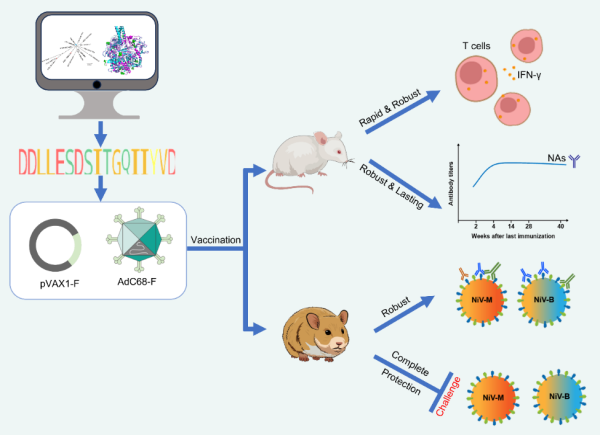In the study published in the journal JCI insight on December 8, entitled Vaccines based on the fusion protein consensus sequence protect Syrian hamsters from Nipah virus infection, Prof. LAN Jiaming at the Shanghai Institute of Immunity and Infection of the Chinese Academy of Sciences, Prof. SHAN Chao and Prof. YUAN Zhiming’s group at the Wuhan Institute of Virology of the Chinese Academy of Sciences, and Prof. Sandra Chiu’s group at the University of Science and Technology of China jointly published their new research. The study developed new Nipah virus vaccines based on the computer-aided design of consensus sequences from multiple strains of Nipah virus, which are expected to be further developed into broad-spectrum Nipah virus vaccines.
Nipah virus is a single-negative-stranded RNA virus of the genus Henipavirus in the family Paramyxoviridae, with bats as its natural host. Nipah virus can be transmitted indirectly to humans via intermediate hosts such as pigs and horses, or directly infect humans, resulting in neurological and respiratory diseases with high mortality of 40-70% in human beings.
Due to its easy transmission, rapid onset, severe symptoms, high morbidity and mortality, and lack of specific counter measures, Nipah virus is classified as a priority C pathogen and a Biosafety level-4 (BSL-4) pathogen. Meanwhile, it is also listed as one of the top 10 infectious diseases of priority concern by the World Health Organization (WHO). The development of an effective vaccine against Nipah virus is of great theoretical and practical significance against Nipah virus infection.
The results of animal experiments showed that AdC68-F and pVAX1-F, alone or in combination, could induce rapid and efficient humoral and cellular immune responses in mice. After vaccine immunization of hamsters, they were infected with lethal doses of NiV-M and NiV-B, respectively, and it was found that none of the hamsters in the vaccinated group showed any clinical signs until 21 days post-infection, and neither virus nor nucleic acids were detected in tissues such as lungs, brain and spleen (Fig. 1).
Prof. LAN is mainly engaged in the research and development of nucleic acid (DNA and mRNA) vaccines and recombinant virus-vectored vaccines against BSL-3 and BSL-4 viruses, such as Nipah virus, Ebola virus, SARS-CoV-2, Crimean Congo hemorrhagic fever virus, and so on. This is the second paper by the team of Prof. LAN’s group in collaboration with Prof. SHAN and Prof. YUAN’s group. The previous study was published in the journal npj Vaccines, entitled Both chimpanzee adenovirus-vectored and DNA vaccines induced long-term immunity against Nipah virus infection on November 4.
Contact
LAN Jiaming
E-mail: jmlan@siii.cas.cn
Reference: https://pubmed.ncbi.nlm.nih.gov/37917215/

